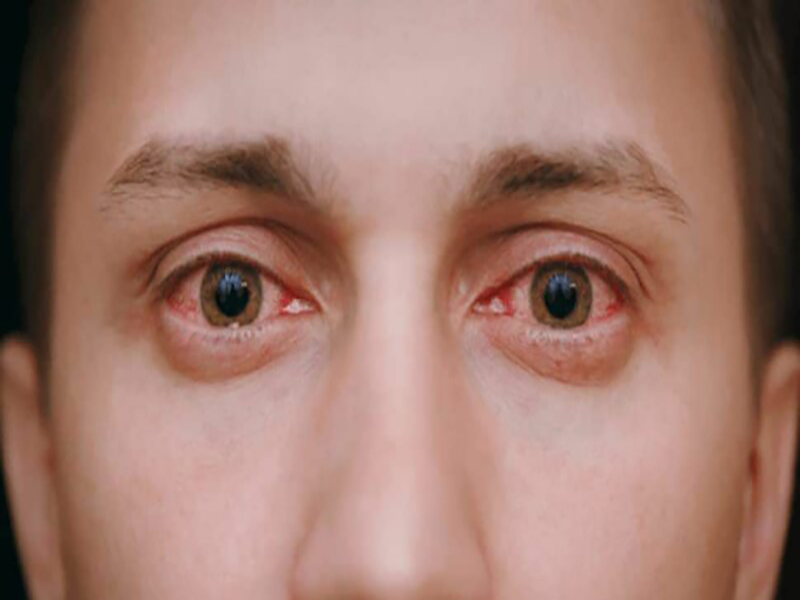

As concerns about air pollution rise, safeguarding your eyes is crucial for overall health. While masks are common, focusing on eye protection is equally important. Here are 8 simple tips to shield your eyes from the effects of air pollution.

Gentle Cleansing Rituals:
Begin your eye-care routine by washing your face and eyes with clean, lukewarm water. This helps eliminate dust and impurities that may have settled on your skin and eyes throughout the day.
-
Say No to Contact Lenses:
Opt for glasses instead of contact lenses during periods of high air pollution. Contact lenses have the potential to trap particles and pollutants against the surface of your eyes, increasing the risk of irritation and discomfort.
-
Handle with Care – No Rubbing:
Resist the urge to rub your eyes, as this can exacerbate irritation. Instead, use a clean, wet cloth to gently comfort your eyes. This method is not only soothing but also avoids the introduction of additional contaminants.
-
Embrace Protective Eyewear:
Invest in wrap-around goggles or safety glasses to shield your eyes from the detrimental effects of poor air quality. These protective accessories act as a barrier against airborne pollutants, reducing the direct exposure of your eyes.
-
Indoor Air Purity:
Enhance the quality of the air you breathe indoors by incorporating HEPA filters into your home and workplace. These filters are designed to reduce indoor air pollutants, providing a cleaner and healthier environment for your eyes.
-
Nutrient-Rich Diets for Eye Health:
Boost your eye health by incorporating vitamins and nutrients into your diet. Include leafy greens, fruits, and Omega-3 fatty acids, as they contribute to maintaining optimal eye function and combatting the impact of environmental stressors.
-
Regular Eye Checkups:
Prioritize your eye health by scheduling regular eye checkups. Routine examinations not only ensure the overall well-being of your eyes but also facilitate the early detection of potential eye diseases, allowing for prompt intervention.
-
Monitor Air Quality:
Stay informed about the air quality and pollution levels in your area. Keep a vigilant eye on updates and take extra precautions when pollution levels are high. Adjust your outdoor activities accordingly and be proactive in protecting your eyes during challenging air quality periods.

Air pollution is a significant global concern, stemming from the extensive production of chemical products, the widespread use of vehicles, and the release of natural gases. This growing issue has increasingly become a major cause of eye problems. Continuous exposure to polluted air can lead to discomfort, dryness, redness, and various other issues that might develop into severe eye conditions. Hence, protecting our eyes from pollution is crucial. If you’re concerned about how to safeguard your eyes from air pollution, this blog provides six practical methods to ensure their protection.
1. Shield Your Eyes with Protective Glasses or Shades
If you’re looking for ways to protect your eyes from air pollution, using protective eyeglasses or sunglasses should be your primary choice. Protective glasses serve as a crucial barrier against harmful pollutants when commuting or spending time outdoors. Sunglasses not only safeguard against UV rays but also shield our eyes from harmful dust particles, reducing the risk of severe eye issues.
2. Resist the Urge to Rub Your Eyes
It’s natural to feel irritation in your eyes caused by pollutants, but rubbing your eyes can worsen the problem. Rubbing can intensify irritation and potentially introduce harmful germs, leading to infections. Instead, use gentle alternatives such as eye drops to alleviate discomfort and soothe your eyes without risking further damage.
3. Use Prescribed Eye Drops
Maintaining appropriate moisture levels in the eyes is important for combating dryness and safeguarding against pollutants. Eye drops are a helpful source for maintaining moisture in your eyes. Consistent lubrication helps relax the eye muscles and reduce irritation caused by pollutants.
4. Utilise Cold Compresses and Stay Hydrated
Extended exposure to pollution can cause inflammation, but relief is possible with cold compresses. Placing a chilled cloth or ice cubes in a soft fabric soothes itchiness and reduces swelling, offering comfort to weary eyes. Staying hydrated is crucial not just for the eyes but for overall health. Drinking plenty of fluids helps flush toxins from the body, improving overall ocular health.
5. Prioritise Regular Eye Check-ups
Don’t overlook minor eye issues, as they can escalate if left untreated. Regular eye check-ups are essential for monitoring your eye health and addressing any concerns promptly. If persistent dryness or discomfort continues despite home remedies, consulting an ophthalmologist is imperative. Early detection and intervention are key to preventing eye conditions from progressing. For a thorough eye check-up, visit Indira Gandhi Eye Hospitals, renowned as one of the best eye care centres in India.
6. Minimise Direct Exposure to Pollutants
Taking proactive measures to reduce direct exposure to pollutants can significantly lower the risk of allergies and irritation caused by pollution. On days when pollution levels are high, try to stay indoors whenever possible. Additionally, practice diligent hand hygiene to minimise the transfer of pollutants to your eyes and surrounding areas.
Hope these 6 methods to protect your eyes from air pollution will solve all your worries about eye care.
Understanding Common Eye Conditions Caused by Air Pollution
The prevalence of smog and other airborne pollutants exacerbates various eye conditions, including:
- Burning: Discomfort due to pollution exposure.
- Redness: Inflammation caused by pollutants.
- Swelling: Response to environmental irritants.
- Soreness: Discomfort from polluted air exposure.
- Watering: Eyes reacting to airborne pollutants.
- Tiredness: Eye strain due to pollution.
- Itching: Sensation triggered by pollutants.
- Allergies: Eye reactions to environmental factors.
- Dryness: Caused by pollution’s drying effect.
Understanding these common eye conditions due to air pollution can help you take better steps to protect your eyes.
Additional Tips for Minimizing Eye Risks
- Healthy Diet and Hydration: To keep your eyes healthy, eat a balanced diet with foods like leafy greens, almonds, berries, and fish. Stay hydrated as well. These choices provide essential nutrients and Omega-3 fatty acids to support eye health and flush out toxins.
- Consider Alternatives to Contact Lenses: If you experience discomfort or irritation caused by pollution, consider temporarily discontinuing the use of contact lenses. Consult with an eye care professional at Indira Gandhi Eye Hospitals for proper guidance and eye care.
- Remove Eye Makeup Before Bed: To reduce the adverse effects of cosmetic products on your eyes, ensure thorough removal of eye makeup before bedtime. Use gentle makeup removers specifically formulated for the delicate eye area to prevent irritation and allergic reactions.
Protecting your eyes from the harmful effects of air pollution requires diligence and proactive measures. By incorporating these six ways to protect your eyes into your daily routine, you can safeguard your vision and enjoy optimal eye health despite environmental challenges.
Conclusion
Safeguarding your eyes from the detrimental effects of air pollution is crucial in today’s environment. With pollutants causing discomfort, dryness, and other issues, it’s essential to adopt protective measures. Implementing the suggested “6 ways to protect your eyes from air pollution” can significantly reduce risks. Additionally, understanding common eye conditions caused by pollution and adhering to additional tips like maintaining a healthy diet, considering alternatives to contact lenses, and removing eye makeup before bed can further enhance eye health. Visit Indira Gandhi Eye Hospitals for expert care and advice on protecting your eyes from pollution.
Eye care tips: 8 ways to protect your eyes in monsoon season
Taking care of your eyes during the monsoon season is important due to increased humidity and the higher risk of infections. Here are eight essential eye care tips for the monsoon season.

During the monsoon season, common eye problems include conjunctivitis (pink eye), styes, dry eyes, and fungal infections. Increased humidity promotes bacterial and fungal growth, leading to infections like conjunctivitis. Stagnant water and moist environments contribute to the spread of bacteria, causing styes and fungal infections. Pollutants carried in rainwater can irritate eyes, exacerbating dry eye syndrome. Proper hygiene, avoiding touching eyes with dirty hands, using clean water for eye care, and wearing protective eyewear can mitigate these issues. Immediate medical attention is advised if symptoms like redness, itching, discharge, or blurred vision occur.
Here are eight essential eye care tips for the monsoon season suggested by Noida-based ENT Dr Neha Sharma.
Keep your hands clean: Regular handwashing with soap and water is crucial to prevent the transfer of harmful bacteria and viruses to your eyes, significantly lowering the risk of infections such as conjunctivitis.
Protect your eyes from rainwater: Shield your eyes with sunglasses or a brimmed hat to block rainwater contaminants, which can cause irritation and potentially lead to infections if they come into contact with your eyes.
Maintain proper hygiene: Use separate, clean towels or tissues for your face and eyes to avoid spreading bacteria and viruses that could cause eye infections.
Use clean water for eye wash: When rinsing your eyes, opt for filtered or boiled water to avoid exposing your eyes to potentially harmful microorganisms present in tap water, reducing the risk of infections.
Avoid self-medication: Always seek advice from an eye specialist before using over-the-counter eye drops to ensure they are appropriate for your condition and to prevent worsening any existing eye issues.
Stay hydrated: Adequate hydration supports the production of tears, helping to keep your eyes moist and comfortable, thereby reducing the chances of dryness and irritation.
Eat balanced diet: Incorporate foods rich in vitamins A, C, and E, as well as omega-3 fatty acids, into your diet. These nutrients are essential for maintaining optimal eye health and supporting overall vision.
Wear prescription eyewear: Properly clean and maintain your contact lenses or consider wearing glasses during the monsoon season to minimise the risk of eye infections. This precaution helps protect your eyes from potential contaminants and irritants in the environment.


:max_bytes(150000):strip_icc():focal(599x0:601x2):format(webp)/Osvaldo-G-Casas-1-081324-5bb1fee76e7243fd89a3eeeb04de607c.jpg?w=1200&resize=1200,0&ssl=1)



:max_bytes(150000):strip_icc():focal(999x0:1001x2)/train-tracks-1-91322-674312f83aa84fe281ee06c03657a5b6.jpg?w=1200&resize=1200,0&ssl=1)



















:max_bytes(150000):strip_icc():focal(754x379:756x381):format(webp)/chow-chow-bowling-green-subway-70ac9e829e20441a978d9f05a1085374.jpg?w=1200&resize=1200,0&ssl=1)
:max_bytes(150000):strip_icc():focal(725x300:727x302):format(webp)/Bridget-Garrison-dogs-tally-karma-01-021926-5f803803830d4771a5d48258b325f341.jpg?w=1200&resize=1200,0&ssl=1)


:max_bytes(150000):strip_icc():focal(749x0:751x2):format(webp)/Dog-missing-in-Colorados-mountains-for-43-days-reunited-with-owner-thanks-to-Summit-Lost-Pet-Rescue-022426-0ebb1d6502764f8eb20d846307727ad0.jpg?w=1200&resize=1200,0&ssl=1)
:max_bytes(150000):strip_icc():focal(743x471:745x473):format(webp)/Abandoned-Dog-at-Airport-022126-d755d65eb323443bade62469ed85c911.jpg?w=1200&resize=1200,0&ssl=1)
:max_bytes(150000):strip_icc():focal(749x0:751x2):format(webp)/rescued-dog-1-030226-b2d2c821a5d74691ba8edd4e8f76508d.jpg?w=1200&resize=1200,0&ssl=1)
:max_bytes(150000):strip_icc():focal(1211x776:1213x778):format(webp)/cats-rescued-22626-91b98a0bd7254a93a6bbf1a223dac5b0.jpg?w=1200&resize=1200,0&ssl=1)
:max_bytes(150000):strip_icc():focal(736x185:738x187):format(webp)/abandoned-puppies-01-021126-de716b3fef81415bb0669b390e8abddd.jpg?w=1200&resize=1200,0&ssl=1)
:max_bytes(150000):strip_icc():focal(749x0:751x2)/Irish-setter-gives-birth-to-record-17-puppies-030326-43c2927d84ed4a59880b16c2c8fdd530.jpg?w=1200&resize=1200,0&ssl=1)





:max_bytes(150000):strip_icc():focal(899x646:901x648)/Tatiana-Schlossberg-Jack-Schlossberg-030126-02-ffbc8841a935444d9a68bdeab3cfe504.jpg?w=1200&resize=1200,0&ssl=1)
